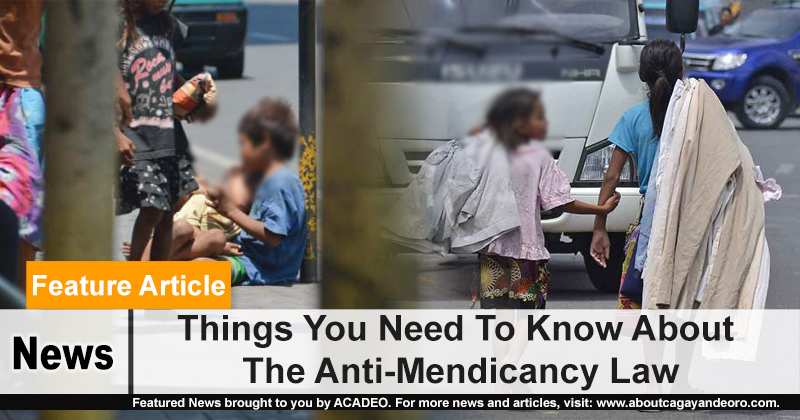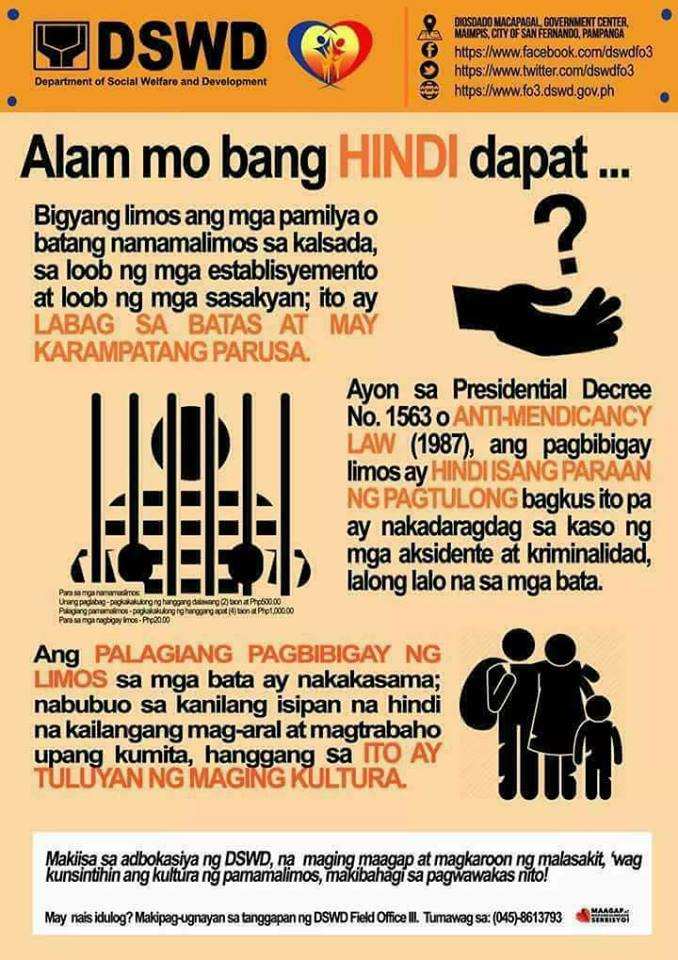10 Nov Things You Need To Know About The Anti-Mendicancy Law
It is alarming to witness the increasing number of mendicants or beggars here in the city of Cagayan de Oro. Everywhere we go, we always see them reaching out their hands to ask for alms and a little kindness from us.
Motorists and passersby would commonly see them around DVSoria while some can be found stationed at Magsaysay Park. Some would even climb on jeepneys just to pass on some envelopes to ask for donations.
At a different turn of events, however, the law has been forbidding us to give alms to the beggars since 1978 through the Presidential Decree No. 1563 popularly known as the Anti-Mendicancy Law of 1978. The law states that giving alms to the needy people who take to the streets to ask for alms is not the right way to help them, but instead, it would only lead to the ballooning of the number of beggars along major streets in the country. It goes to say, according to the law, that giving alms would only make beggars think that they don’t need to find a decent job anymore to earn money for a living as they could easily make money by asking people for it through begging in the streets.
In its most straightforward definition, the Anti-Mendicancy Law of 1978 aims to eradicate widespread street begging in the country.
Who are covered under the decree?
– Mendicants
– Exploited infants or children (8 years and below)
– Minors found begging
– Those who are covered by Presidential Decree No. 603 (Child and Youth Welfare Code)
– Parents of exploited infants and children criminally liable under Article 59 and 60 of Presidential Decree No. 603 (http://pcw.gov.ph/law/presidential-decree-no-603)
What is a Mendicant?
Mendicant refers to any person who has no visible and legal means of support and instead uses begging as a means of living.
Apprehension of and services for persons found begging:
– Any infants or child 8 years old and below who is found begging or is being utilized by a mendicant for purposes of begging shall be apprehended as a neglected child and shall be committed to the custody and care of the Department of Social Services and Development or to any licensed child placement agency
– Any minor over 9 years of age under 15 found begging or is being utilized for purposes of begging and who acted without discernment shall be apprehended as a neglected child and shall be committed to the custody and care of the Department of Social Services and Development or to any licensed placement agency
– Any minor over 9 years of age and under 15 who is found begging or is being utilized for the purpose of begging and who acted with discernment shall be proceeded against in accordance with the provisions of Chapter 3, Title VIII of Presidential Decree No. 603.
– Any person not otherwise covered in the preceding paragraph of this Section who is found begging and who is physically or mentally incapable of gainful occupation shall be provided the integrated package of services by the Department of Social Services and Development, the Welfare units of local governments and other cooperating agencies
The Penalty:
– a mendicant upon conviction can be punished by a fine not exceeding P500 or by imprisonment for a period not exceeding 2 years or both at the discretion of the court
– habitual mendicant shall be punished with a fine not exceeding P1,000 or by imprisonment for a period not exceeding 4 years or both at the discretion of the court
– any person who abets mendicancy by giving alms directly to mendicants exploited infants and minors on public roads, sidewalks, parks, and bridges shall be punished by a fine not exceeding P20.00
Despite the existence of such law, the number of mendicants in the country continues to increase.
The Anti-Mendicancy Law has been in effect since it was issued by former president Ferdinand Marcos in 1978. Aside from its goal to control and eradicate mendicancy, it also promotes social justice and protection of life, property, and dignity of the citizens of the Philippines.




No Comments